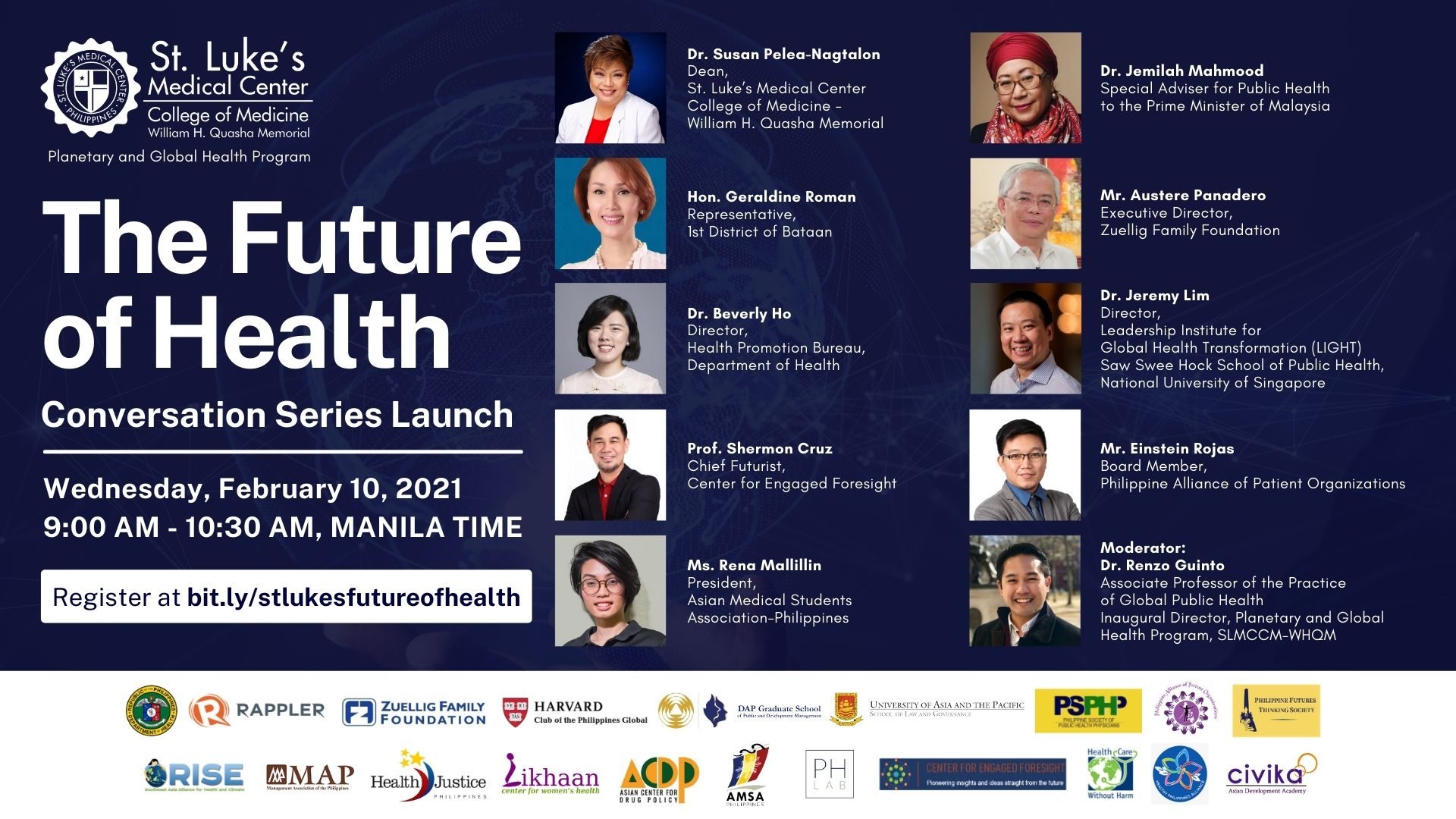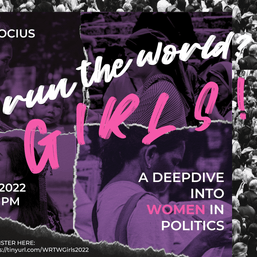SUMMARY
This is AI generated summarization, which may have errors. For context, always refer to the full article.

“What is the future of health in the Philippines?”
This is the central question that the webinar series “The Future of Health” aims to answer. The webinar was launched at the St. Luke’s Medical Center (SLMC) College of Medicine through its new Planetary and Global Health Program that convened health leaders from the Philippines and abroad.
In order to envision the future of health in the post-coronavirus era, doctors must first arrive at a working diagnosis of the health condition. The same is true of the Filipino nation.
Shermon Cruz , vice president of the Philippine Futures Thinking Society, pointed out the gaps in the healthcare system. “We created a healthcare system that is inaccessible, inefficient, expensive, and elitist,” he said.
For Cruz, the health sector has also rendered patients powerless, which should not be the case.
“Patients are also capable of providing the solutions. We must empower patients to become the new healthcare decision makers. Healthcare must aim to personalize and not generalize. We also want health promotion rather than mere treatment of disease,” said Einstein Rojas, a board member of the Philippine Alliance of Patient Organizations.
Importance of prevention and community
“Medicine has also become too much focused on cure. The COVID-19 pandemic reinforced the importance of preventive health services,” said SLMC College of Medicine Dean Dr. Susan Pelea-Nagtalon, citing the need to provide solutions through a patient-centered approach.
Dr. Jeremy Lim, director of the Leadership Institute for Global Health Transformation based at the National University of Singapore, shared Singapore’s experience in moving from healthcare to health creation.
“Over the years, our government increased the budget for health promotion. We pay Singaporeans a few dollars to walk a certain number of steps per week. Fundamentally, we pay people to be healthy. Paying a couple of cents today will save us hundreds of dollars 20 to 30 years from now,” he said.
Lim also challenged the hospital-oriented and specialist-centric model of healthcare not only in the Philippines but across Asia.
Nagtalon said there is a need to reorient health services, asking, “Do we serve only those who come to the hospital, or those who do not come to the hospital?”
She acknowledged that medical schools such as St. Luke’s will need to be at the forefront of this necessary shift in healthcare. In recent years and especially during the pandemic, the college introduced innovations including new course offerings in community and global health.
Essential primary care
To bring health to the communities, a functional primary care system is also essential.
“Primary care requires a team of healthcare providers – more than just a physician – that is taking care of families and communities,” said Dr. Beverly Ho, director of the Health Promotion Bureau of the Department of Health.
Austere Panadero, executive director of the Zuellig Family Foundation – which works with mayors to strengthen local health systems in rural areas – cited the importance of improving the skills of barangay health workers.
“We must value most especially the barangay health workers – we must ensure they are able to develop the right competencies so they can perform what they are expected to do,” said Panadero.
These multiple shifts that need to happen in the health sector –involving patients in coming up with solutions, focusing on prevention instead of cure, reorienting health services in communities, establishing functional primary care system – are critical not only because of COVID-19 but also because of other existing and emerging health challenges.
Dr. Jemilah Mahmood, Special Advisor to Malaysian Prime Minister Muhyiddin Yassin on Public Health, highlighted that COVID-19 is not a pandemic on its own, but a “syndemic” of multiple epidemics such as noncommunicable diseases like heart disease and diabetes, as well as the mental health crisis.
Panadero also cited the hidden epidemic of stunting, which affects Filipino children especially in impoverished areas, as this will affect future generations.
These problems, according to Bataan 1st District Representative Geraldine Roman, are the “fruit of several generations of misprioritization, lack of political will, and oftentimes neglect.”
She was particularly concerned about the implementation of the Universal Health Care (UHC) Act of 2019, which has been derailed by the COVID-19 pandemic. “UHC is not only a funding issue, but also a governance one,” Roman said.
Last year, the Philippine Health Insurance Corporation (PhilHealth) announced the delay in the implementation of UHC Act due to shortfalls in the collection of premiums during the pandemic. (READ: House ‘ready to review’ UHC law provisions on PhilHealth contribution hikes)
Digital and global
To address healthcare problems, health leaders stressed the need to go digital and global. Panadero said that the digitalization of healthcare can play a critical role in improving healthcare access – provided that mobile devices and internet connectivity are made available especially to those living in remote areas.
“Without digital health, we cannot move forward fast…. Technology must be harnessed more effectively to make services more accessible to the last mile,” he said.
Nagtalon also noted that exponential growth of the use of telemedicine during the COVID-19 pandemic, so medical schools like St. Luke’s must ensure that they are producing tech-enabled health professionals.
“I don’t think we will go back to the situation where doctor’s offices are overcrowded with waiting patients,” Nagtalon added.
It is also important to remember that the health issues of the Philippines are not detached from regional and global realities. Mahmood stressed the importance of engaging with the Association of Southeast Asian Nations (ASEAN), of which the Philippines is a member.
“During the COVID-19 pandemic, I saw missed opportunities…. We could have strengthened ASEAN, leveraging on the capacities and knowledge of all 10 member countries,” Mahmood said.
For instance, she said that ASEAN could have negotiated with pharmaceutical companies as a regional bloc to ensure that there is equitable sharing of vaccines and no one will be left behind.
Mahmood also encouraged Filipinos to advocate for the establishment of an ASEAN Center for Disease Control (CDC), which will coordinate disease control efforts across the region – similar to the ones in the European Union and African Union.
She also cited the inextricable link between COVID-19 and the climate crisis. There is growing evidence that climate change increases the likelihood of future pandemics, among other diseases.
“Our ongoing COVID-19 response is also adding pressures to our ecosystems…. In Malaysia for example, we anticipate 10 million masks a day are being released to the environment…. We need not just a public health, but a planetary health approach.” she added.
Revitalized movement
To turn these ideas into action, Roman pushed for a National Blueprint for Healthcare Development.
“Such plan will lay down our short-, medium- and long-term health objectives, budgetary requirements, and clear-cut assignments of all stakeholders,” the lawmaker said.
Drawing from the Malaysian experience, Mahmood suggested that the Philippine health community must “find champions from different levels of society” to drive this much-needed health transformation.
Panadero, moreover, suggested the need to “mobilize a national process that will involve not only our leaders but also our communities.” –Rappler.com
Dr. Renzo Guinto is an Associate Professor of the Practice of Global Public Health and the inaugural director of the Planetary and Global Health Program at the St. Luke’s Medical Center College of Medicine-William H. Quasha Memorial. He is also a member of the Board of Trustees of the Philippine Society of Public Health Physicians and the Lancet-Chatham House Commission on Improving Population Health Post-COVID-19.
Add a comment
How does this make you feel?




![[WATCH] #PHVote dialogues: Your checklist for the 2022 elections](https://www.rappler.com/tachyon/2021/10/PHVote-dialogue-sq-1.jpeg?resize=257%2C257&crop_strategy=attention)
There are no comments yet. Add your comment to start the conversation.